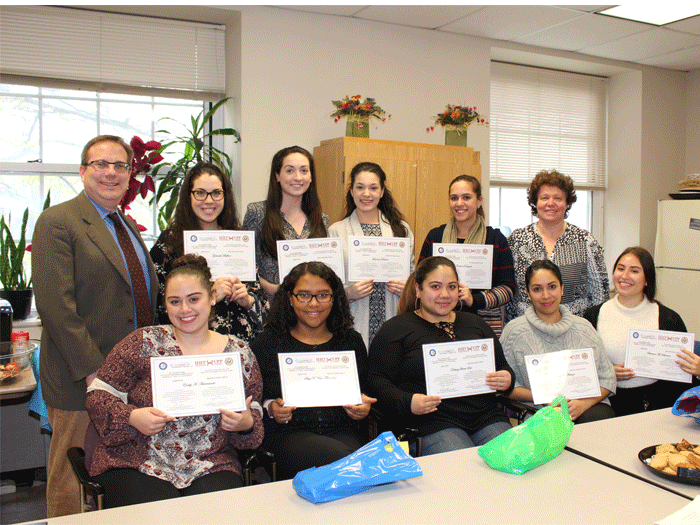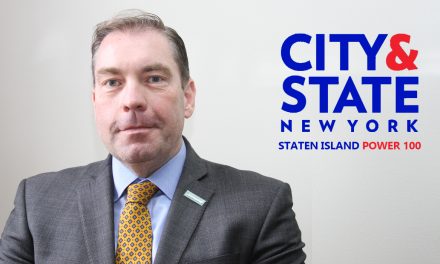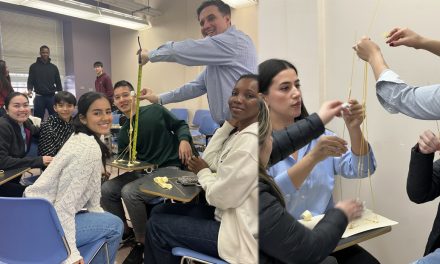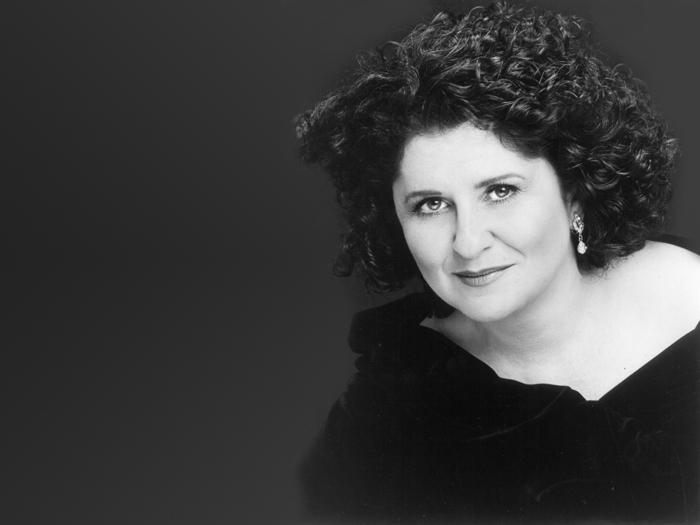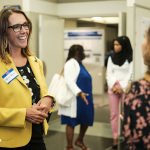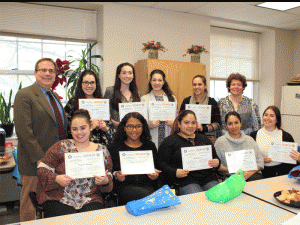
Dean Gold (far left) and Dr. Lyublinskaya (far right) with CSI students holding their completion certificates.
While approximately 5,379 miles lie between the College of Staten Island (CSI) and Russia, that did not stop ten CSI students from collaborating with students at the Pedagogic Institute of Vladimir State University in Russia on the “Development of Elementary School Technology-based Geometry Curriculum and Field Testing of Materials with Pre-Service Elementary School Teachers” Project.
Made possible through a $40,000 grant from the Eurasia Foundation U.S.-Russia University Partnership Program funded by the U.S. Department of State, the project was comprised of several components. First, CSI Education students worked with their Russian counterparts via Skype on learning how to use and effectively teach with an app called GeoGebra. Once adequately trained through a series of Saturday workshops, students then applied their new skills, teaching elementary school children using the app at three Staten Island schools: PS 31, 45, and 48.
Led by Irina Lyublinskaya, PhD, Professor of Curriculum and Instruction at CSI, the initiative is a partnership between the School of Education at CSI and the Pedagogic Institute at the Vladimir State University. As part of the project goals, Dr. Lyublinskaya and Dr. Svetlana Tikhomirova, her counterpart at Vladimir State, also developed curriculum materials for an elective short course for pre-service teachers during their student teaching experience. This course provides professional development on teaching geometry with computer technology in elementary schools.
Dr. Lyublinskaya also provided the expertise in technology, integrating mathematics teaching and learning, with Dr. Tikhomirova, Professor of Mathematics at Vladimir State.
“While the U.S. education system is well known for the implementation of inquiry-based approaches to teaching and for using educational software for student explorations and learning, the Russian education system is well known for its rigorous approach to mathematics content starting as early as elementary school, and for strong foundations in mathematics teaching methods. Combining expertise from both countries will lead to an enhanced experience for pre-service teachers in both universities,” said Dr. Lyublinskaya.
The project culminated in a ceremony when participating students received completion certificates from Kenneth Gold, PhD, Founding Dean of the School of Education, and also small gifts that Dr. Lyublinskaya brought back from Russia. Professor Ruth Silverberg, Chair of the Department of Educational Studies; Deirdre Armitage, PhD, Director of Fieldwork; and Margaret Berci, PhD, Chair of the Department of Curriculum and Instruction were also present, engaging in introspective questions with the students regarding their confidence in teaching mathematics with technology.
“My students loved working with the iPads since they do not get to use technology too often in the classroom… Incorporating technology really made it a fun learning experience. I will definitely be using GeoGebra in my future lessons,” noted CSI student Ermina Dragovic ’17.
“Working with GeoGebra was a rewarding experience. Not only did I gain confidence in integrating technology into my lessons, but also feel more comfortable teaching mathematics. The students, with all different learning abilities, all did equally well on the activity. I am going to continue using this APP in future mathematic lessons, while also researching about other APPS to use for literacy, too!,” said Emily Arredondo.
“The most enjoyable aspects of the workshops were being able to collaborate with student teachers in another country, working together as a group to participate in this research, and learning more about the use of technology in the classroom though mathematics,” commented CSI student Gabriela Belfiore ‘17.
“I am so pleased that students benefitted from an outstanding exchange program without having to leave their home country. This was very much a project of the 21st Century. Through technology, Russian and U.S. students collaborated on the teaching of mathematics with technology,” noted Kenneth M. Gold, PhD, Founding Dean of the School of Education.
The U.S.-Russia University Partnership Program (UPP) is an initiative for mutual cultural and academic collaboration that connects higher education institutions in Russia and U.S. with one another, and supports the launch of new bilateral partnerships. UPP is implemented by the Eurasia Foundation (U.S.) and the National Training Foundation (Russian Federation) with funding from the U.S. Department of State.

